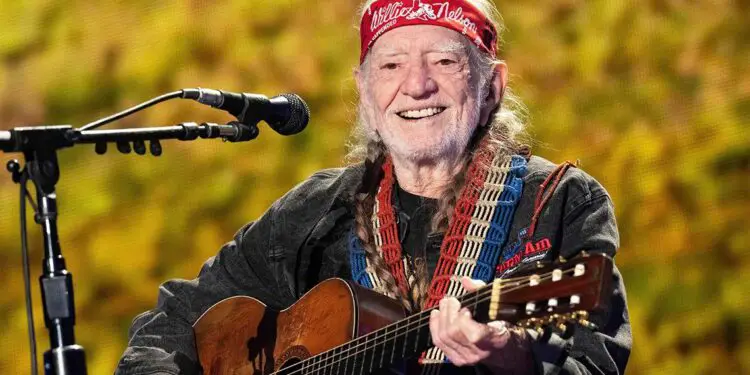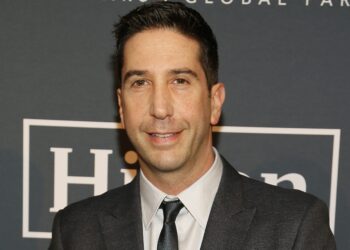Willie Nelson, born on April 29, 1933, is an American country singer, guitarist and songwriter known for his outlaw country music style.
He has a rich musical career, acting in over 30 films, co-authoring books, and advocating for causes like biofuels and marijuana legalization.
Nelson’s legacy includes inductions into the Country Music Hall of Fame, the Kennedy Center Honors and the National Agricultural Hall of Fame.
He is also recognized for his activism, receiving awards for his contributions to world peace and agriculture.
| Net worth | $25 million |
| Profession | Country singer, guitarist |
| Date of birth | April 29, 1933 |
| Nationality | American |
Background
Nelson was born to Ira and Myrle Nelson.
His parents were young during the Great Depression and his mother left soon after his birth.
Nelson and his older sister, Bobbie, were raised by their grandparents after their father remarried and moved away.
Nelson’s grandfather, William, bought him a guitar at the age of six and taught him a few chords, sparking his interest in music.
His family’s roots can be traced back to Major John Rogers Nelson, a major with the 1st North Carolina regiment during the American Revolutionary War, who fought on the American side.
Nelson’s parents moved from Arkansas in 1929 in search of work, and his grandparents played a significant role in raising him and his sister.
Net worth
Nelson has an estimated net worth of $25 million.
He accumulated his net worth through various sources, including his music career, where he released numerous albums, had hit songs, and performed in concerts like Farm Aid, raising over $70 million.
Additionally, Nelson’s income streams include royalties from songs he has written and performed, as well as his work as an actor, author and activist for causes like farm aid and marijuana legalization.
Despite financial setbacks, such as tax issues in the 1990s, his resilience and diverse talents have contributed to his lasting success and net worth.
Tax issues
Nelson faced significant tax issues with the IRS, culminating in a $32 million tax debt in 1990, which led to the seizure of his properties and assets in six states.
The IRS alleged that much of his income was hidden in tax shelters due to mismanaged earnings and bad advice from his accountants.
Despite the financial setback, Nelson refused to file for bankruptcy and aimed to settle the debt honorably, eventually reaching an agreement with the IRS in 1993 to pay $9 million to clear the remaining debt.
To raise funds, he recorded the album, The IRS Tapes: Who’ll Buy My Memories, featuring acoustic renditions of his songs, with the goal of selling four million copies to pay off his debt.
Real estate
Nelson resides on a 300-acre estate in Spicewood, Texas, where he has lived since 1983.
The property includes a 13,691 square foot home with 4 bathrooms, a swimming pool, and ample space for his rescue horses.
Additionally, Nelson owns The Pedernales Country Club, a golf course near his Texas home.
Nelson also owns a tropical getaway home in Maui, Hawaii, where he hosts celebrity-packed poker games.
The 6,038 square foot Maui home, purchased in 1983 for $450,000, features 6 bedrooms, 6 bathrooms and an outdoor swimming pool steps away from the beach.
Nelson previously owned a 150-acre property in Goodlettsville, Tennessee, close to Nashville.
The property, listed for $2.5 million, includes pastures, woods, trails, and a rustic log cabin that Nelson built.
This property has a rich history, with Nelson being one of only two owners before it was seized by the IRS in the early 1990s.
Nelson’s 44-acre Dripping Springs ranch and house were sold in 1991 for the minimum bid of $203,840, reflecting another part of his real estate portfolio.
Career
Nelson began playing in local bands at the age of nine and moved to Nashville in 1960 after his composition, Family Bible, became a hit for Claude Gray.
In Nashville, he established himself as a talented songwriter, scoring hits with songs like Crazy (Patsy Cline), Funny How Time Slips Away (Billy Walker) and Hello Walls (Faron Young).
Nelson’s unique singing style, however, was less appreciated in Nashville, leading him to move back to Texas in 1972.
There, he let his hair and beard grow long, wrote and sang the way he wanted, and gained complete creative control over his records.
Nelson’s debut release for Columbia Records, The Red Headed Stranger, was a minimalist concept album that became a huge hit, thanks in part to Nelson’s spare cover of Fred Rose’s Blue Eyes Crying in the Rain.
His brand of country music, known as Outlaw Country, revealed his versatility and wide-ranging interests, including collaborations with artists like Merle Haggard and Waylon Jennings and 1978’s Stardust, a collection of classic pop songs that sold four million copies.
Nelson’s awards are numerous, including 11 CMAs, 12 GRAMMYs, and 6 ACMs.
He was inducted into the Country Music Hall of Fame in 1993, received the GRAMMY Lifetime Achievement Award in 1999, and won the Library of Congress Gershwin Prize in 2015.
In 2003, CMT placed him at No. 4 among the Greatest Men of Country.
And, in 2008, Nelson’s distinctive vocal style earned him the No. 88 spot on Rolling Stone magazine’s list of 100 Greatest Singers of All Time.
Awards and accolades
Nelson’s awards and accolades include a total of 11 Grammy Awards, with categories such as Best Country Album, Best Male Country Vocal Performance and Best Country Song.
He has also won 7 Country Music Association Awards, including Album of the Year, Single of the Year, and Musical Event of the Year.
Additionally, Nelson has received 9 Academy of Country Music Awards, such as Entertainer of the Year, Male Vocalist of the Year and Single Record of the Year.

In 1993, he was inducted into the Country Music Hall of Fame, cementing his place as a legendary figure in the genre.
In 1998, Nelson was honored with the Kennedy Center Honors for his contribution to American culture through music.
He has also received a Poet’s Award in 2017 and a Gene Weed Milestone Award in 2004.
Throughout his career, Nelson has been nominated and won numerous awards at the Grammy Awards, American Music Awards and Country Music Association Awards, highlighting his lasting impact on the music industry.
Philanthropic efforts
Nelson is known for his philanthropic efforts, particularly in the areas of farming, food security and rural communities.
He established Farm Aid in 1985 with Neil Young and John Mellencamp to assist and raise awareness about the importance of family farms.
Nelson and his wife, Annie, have also been involved in sustainable biodiesel initiatives, including the building of two plants in Oregon and Texas and the branding of Willie Nelson Sustainable Biodiesel.
In 2010, he received the Feed the Peace award from The Nobility Project for his work with Farm Aid and overall contributions to world peace.
Nelson has also been an active voice in the drive to ban the slaughter of wild horses and has written to Congress in support of the American Horse Slaughter Prevention Act.
He is an Honorary Trustee of the Dayton International Peace Museum and has contributed to various charitable causes, including addiction, AIDS & HIV, animals, cancer, children, conservation, creative arts, diabetes, disaster relief, economic/business support, education, environment, family/parent support, health, human rights, hunger, miscellaneous, peace, poverty and substance abuse.
Legal issues
Nelson has had a long history of legal issues, including several arrests for marijuana possession and tax-related troubles.
In 1974, he was arrested in Dallas, Texas, for marijuana possession, and in 1990, he faced a significant tax debt of $32 million due to unpaid taxes.
His attorney, Jim Goldberg, negotiated the amount down to $16 million, and Nelson released the album The IRS Tapes: Who’ll Buy My Memories? to help cover the debt.
The IRS seized many of his assets, including properties, musical instruments and equipment, but much of it was bought back by friends and supporters.
In 1994, Nelson was arrested in Waco, Texas, for marijuana possession, but was later found not guilty. He was also arrested in the Bahamas in 1997 for marijuana possession and was banned from the country upon his release.
In 2006, Nelson and others on his tour bus were arrested after police found substantial amounts of marijuana and hallucinogenic mushrooms.
In 2010, he was busted again for marijuana after police found weed on his tour bus at a border checkpoint.
Despite these legal issues, Nelson has been an advocate for the legalization of marijuana and has been involved in activism for the use of biofuels and the legalization of marijuana.
He has been arrested five times because of marijuana and had troubles with the IRS in 1992, but has managed to get off scot-free from his many arrests related to marijuana, with penalties being light.
Personal life
Nelson has been married four times and has eight children from these marriages.
His first wife was Martha Matthews, with whom he had three children, namely Lana, Susie and Willie Nelson Jr.
Nelson’s second wife was Shirley Collie, a successful rockabilly singer, yodeler, guitarist and songwriter.
They often toured together, but their marriage ended after Shirley discovered a bill from a Houston hospital indicating that Nelson had fathered a baby with another woman, Connie Koepke.
Nelson and Shirley divorced in 1971.
Nelson married Connie Koepke in the same year he divorced Shirley.
They had two daughters together, Paula Carlene and Amy.
Their 16-year marriage ended in 1988 due to Willie’s wandering ways.
Nelson’s current wife is Annie D’Angelo, whom he met while working on the film Stagecoach in 1986.
They have been married since 1991 and are still together after 30 years.
Willie’s children include Lana, Susie, Willie Nelson Jr., Paula Carlene, Amy, Billy, Lukas and Micah.
Some of his children have followed in his footsteps and are involved in the music industry.
























